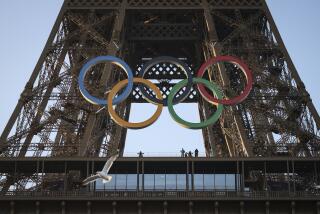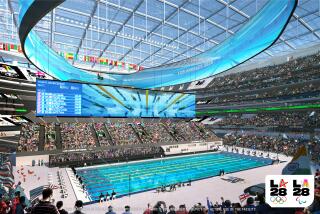The Show Modestly Goes On : Goodwill Games: Because of budget cuts, opening ceremony is a scaled-down production.
- Share via
ST. PETERSBURG, Russia — In Boris Petrov’s vision, the Kirov Stadium field during the Goodwill Games’ opening ceremony Saturday would have been transformed into the surface of Mars, where three astronauts and three cosmonauts would have touched down together in an expression of 21st Century camaraderie between the United States and Russia.
But when the St. Petersburg Organizing Committee slashed his budget by two-thirds, from $9 million to $3 million, his grand illusion crashed to earth with the force of the Shoemaker-Levy comet.
Petrov, who also directed opening ceremonies in Moscow for the 1980 Summer Olympics and the 1986 Goodwill Games, said he was proud of Saturday’s more modest presentation, attended by about 70,000 and presided over by Russian President Boris Yeltsin. A deflated Petrov acknowledged, however, that it was inferior to his first version.
As did Petrov, organizers also envisioned an event that was out of this world when they were awarded the third Goodwill Games. But although it seems clear now that they underestimated the enormity of the challenge of staging the first international multi-sport competition in Russia since the collapse of the Soviet Union, they, unlike Petrov, remain undaunted.
Lecturing reporters in a news conference before the opening ceremony, St. Petersburg Mayor Anatoly Sobchak, punctuating his remarks with a bellowing voice and pointed finger, boldly declared that the Games “will be remembered as one of the best sporting events in history.”
Although that prediction is likely to be deposited--after the closing ceremony two weeks from today--under the category of a politician’s hyperbole, there are indications that these Goodwill Games will be more memorable than their predecessors.
It might even be said that they have arrived at the threshold of legitimacy. Considered strictly a Ted Turner production in 1986 in Moscow and 1990 in Seattle, they have attracted the attention and a modest rights fee from a major network. While Turner’s TBS remains the principle broadcaster, televising 64 hours over 16 days, ABC will carry 17 hours in three weekends.
More significantly, International Olympic Committee President Juan Antonio Samaranch, who as recently as four years ago said the Goodwill Games added unnecessary clutter to the international sports calendar, gave them his stamp of approval. The former Spanish ambassador to the Soviet Union delivered a two-minute speech, in Russian, during the opening ceremony. Earlier Saturday, he referred to the Games as “an important part of the Olympic movement.”
It also is impossible to argue with Turner’s assertion Saturday that there are more outstanding athletes here than at any other multi-sport event outside of the Olympics. Among the more than 2,000 athletes from 55 countries competing in 24 sports are many of the world’s best in track and field, swimming and diving, boxing, weightlifting, gymnastics and figure skating.
The lasting images of the 1994 Goodwill Games, however, probably will be provided by this spectacular host city of 5 million constructed in 1703 by Peter the Great as Russia’s Gateway to the West. It is doubtful he had a clue when he was building the city’s cornerstone, the Peter and Paul Fortress, that it someday would become a venue for beach volleyball.
“The star of the Games will be the city of St. Petersburg,” said Jack Kelly, Goodwill Games president.
But the city has not been an ideal partner in the triumvirate that also includes Turner and the Russian Olympic Committee. Even though the local government has been enthusiastic, contributing $140 million of the $210 million cost, there were too many obstacles to overcome after the tumultuous changes in the country.
With several of the 11 venues still undergoing construction last week, the rush was so great at the SKA Swimming Pool that a mishap with the filtration system prevented the competition from beginning as scheduled Saturday.
The proposed cycling velodrome remained on the drawing board because of a dispute with a trade union. A part for one of the scoreboards at the site for track and field, Petrovsky Stadium, was ordered earlier this year from Hungary but never arrived. The driver who was entrusted with the part was last seen crossing the border into Ukraine.
Ticket sales have been anemic at best. Organizers said Friday that half of 530,000 available tickets had been sold. But the English-language St. Petersburg Press, quoting sources within the organizing committee, reported that the number was significantly less.
Prices ranged from $2.50 to $35 until Friday, when organizers, acknowledging that many residents of the economically depressed region could not afford them, cut them by one-third. They also said they were considering adding groups to the schoolchildren, retirees, construction workers and Olympic athletes who had been promised free admission. But distribution seemed to be as much of a barrier as cost as would-be purchasers complained they could not find tickets.
Considering the circumstances, Kelly said the fact that the Games will go on is a miracle.
“When we signed the initial contract four years ago, we were dealing with Leningrad in the Soviet Union and our partners were the Soviet Sports Committee and Soviet television,” he said. “If we had had a picture then of the totality of the changes that would occur between then and now, I’m not sure we would have gone ahead.”
When Turner suggested that might happen in 1992, Sobchak defiantly said St. Petersburg would carry on alone, further intensifying criticism from those in the city who complained that the millions of dollars going toward the Goodwill Games could have been better spent. Sobchak insisted then, as he does now, that the Games are an investment in the city’s future, advertising to the world that St. Petersburg is open for business.
In that philosophy, he is closely related to Turner. Announcing in 1985 that he was founding the Goodwill Games to heal the wounds between the Soviet Union and the United States caused by the Summer Olympic boycotts of 1980 in Moscow and 1984 in Los Angeles, Turner, in his own mind, succeeded beyond his wildest dreams. He has apportioned himself at least a little credit for the end of the Cold War.
Turner, however, is not merely a diplomat. He also is a businessman who knows better than anyone what the Goodwill Games have cost him: $44 million in 1986, $27 million in ’90 and an estimated $10 million this year.
But he said Saturday that he is paid $500 million a year from cable operators to provide original programming, and that the Goodwill Games will remain as part of that package for the foreseeable future. The 1998 edition already has been awarded to New York. Besides, if they ever become profitable, Turner will own them outright. “They’re an investment,” he said.
That is a language understood by everyone in the capitalist world, including Russia. For a more probable preview of the 21st Century, perhaps Petrov should have replaced the astronauts and cosmonauts with American and Russian investors arriving hand-in-hand at the World Bank.
More to Read
Go beyond the scoreboard
Get the latest on L.A.'s teams in the daily Sports Report newsletter.
You may occasionally receive promotional content from the Los Angeles Times.






